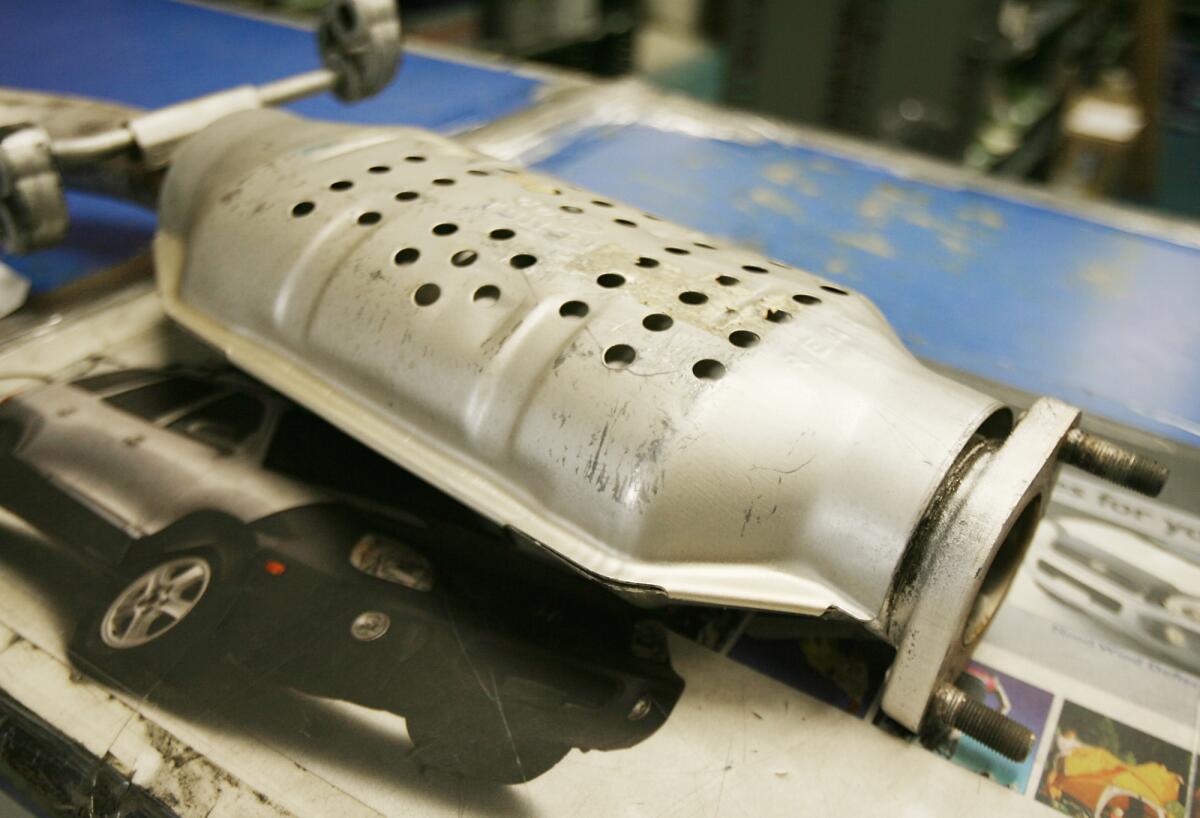Catalytic converter thefts skyrocket in California during the pandemic

- Share via
Terrence McNally didn’t notice anything unusual when he got into his Toyota Prius one morning in December.
Then he started the engine.
“It sounded like I had a Harley-Davidson in the back seat,” said the 72-year-old Long Beach resident.
McNally was among a growing number of victims of catalytic converter theft. Every car comes equipped with the device, which is made with precious metals that reduce the vehicle’s toxic emissions, outputting less harmful exhaust like carbon dioxide.
The parts have become an unusual windfall for thieves, who can make hundreds of dollars selling them to auto parts suppliers or scrapyards. Catalytic converters can be melted and the highly valuable metals, like palladium and rhodium, extracted. Because of the global demand for the critical emission-control devices, just an ounce of the precious metals themselves can be worth thousands of dollars.
Catalytic converter thefts have always plagued car owners in big cities, but crime reports have skyrocketed since the beginning of the pandemic. In Los Angeles County alone, the Sheriff’s Department reported a 400% increase in catalytic converter thefts from 2019 to 2020. Across California, catalytic converter replacements have increased more than 90% during 2020, said Doug Shupe, AAA spokesman.
“It really is showing us … unfortunately, that the pandemic really did cause some economic distress and hardships for many people,” Shupe said. ”That’s led to, I guess you could call, enterprising criminals with more time on their hands, and people who are looking for ways to make quick money.”
On Wednesday, Los Angeles County sheriff’s deputies arrested 19 suspects believed to be involved in a series of thefts in recent weeks. Authorities also recovered a stash of 250 parts — at an estimated value of $750,000 — plus a “ghost” handgun and approximately $100,000, following an hours-long search at four different locations, Sheriff’s Department spokesperson Natalie Arriaga said.
Toyota Priuses are a favorite target because the hybrid vehicles emit fewer toxins, leaving a cleaner and more valuable catalytic converter. Strict laws governing the sale and use of aftermarket catalytic converters make it difficult to secure a cheaper replacement. As a result, Toyota dealerships often have a months-long backlog of orders for the parts, said Avi Margalit, owner of the Los Angeles auto repair shop Hybrid Fix.
He said the government should ease its restrictions on replacement catalytic converters so customers don’t have to pay so much.
“I’d like to see the state of California ease their restrictions a little bit, because at the end of the day, these devices are supposed to be keeping the air clean,” Margalit said. “There are people that … are driving around polluting, because they can’t afford the $3,000 [for a replacement], or they didn’t have the insurance for rental coverage.”
Thanks to his comprehensive insurance plan, McNally paid only a $250 deductible at his Toyota dealership for a new catalytic converter, which cost more than $2,000. But he also spent about $100 to rent a car while waiting for the replacement for three weeks.
Margalit said he tries to make the replacements more difficult for thieves to steal. He’ll weld the new catalytic converter to the car or add extra bolts. He always engraves it with the vehicle identification number and, in recent years, inscribes into every replacement, “Stolen. Call police.”
“I don’t expect a thief would actually read that and report it stolen,” Margalit said. “I’m doing it to kind of mess with them, or if they try to sell it.”
The onus for preventing thefts largely falls on car owners like Mary Ann Holm, 58, who woke up one December morning to find that someone had stolen the catalytic converter from her Honda Element, parked on a residential street in Long Beach.
She called the police and got the part replaced. But before she drove her fixed car off the lot, she started searching for a way to prevent another theft.
“I knew that once I repaired it, that these thieves would probably come back to take it,” Holm said. “It’s kind of a really good plan for a theft like this — they know you’re going to go get it replaced, and you’re going to have a brand-new one.”
She bought a large iron cage to cover the catalytic converter and had it installed for almost $300. In less than a month, someone tried to saw it off again.
“I figured that if anyone cuts through that thing, they need it,” the social worker said with a laugh.
Preventive products, like catalytic converter cages or clamps, are in high demand. Kate Brueggemeier, general manager of the Ohio-based company CatClamp, said business has experienced “exponential growth,” increasing twentyfold in the last 18 months.
“We’re doing everything we can to keep our supply lines intact, but the orders just are coming in about as fast as we can get them out,” Brueggemeier said, adding, “Theft has just gone through the roof.”
Cages can deter thieves, as can welding the catalytic converters to cars. Shupe recommended storing vehicles in locked garages or well-lighted areas outside. Car alarms may be recalibrated to sound when someone is tinkering underneath the vehicle, too, he added.
But adding preventive measures doesn’t stem the root of the problem. Brueggemeier said law enforcement should crack down on scrapyards, and Shupe suggested inscribing catalytic converters with vehicle identification numbers, to alert dealers to stolen parts.
“If the suppliers just stopped simply buying what is likely a stolen part, then the problem could considerably slow down,” Shupe said.
More to Read
Sign up for Essential California
The most important California stories and recommendations in your inbox every morning.
You may occasionally receive promotional content from the Los Angeles Times.














